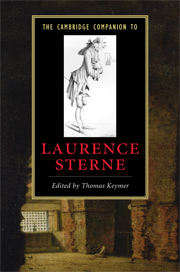Book contents
- Frontmatter
- Introduction
- 1 Laurence Sterne’s life, milieu, and literary career
- 2 Scriblerian satire, A Political Romance, the ‘Rabelaisian Fragment’, and the origins of Tristram Shandy
- 3 Tristram Shandy, learned wit, and Enlightenment knowledge
- 4 Tristram Shandy and eighteenth-century narrative
- 5 The Sermons of Mr. Yorick: the commonplace and the rhetoric of the heart
- 6 A Sentimental Journey and the failure of feeling
- 7 Sterne’s ‘politicks’, Ireland, and evil speaking
- 8 Words, sex, and gender in Sterne’s novels
- 9 Sterne and print culture
- 10 Sterne and visual culture
- 11 Sterne and the Modernist Moment
- 12 Postcolonial Sterne
- Further reading
- Index
- Series List
3 - Tristram Shandy, learned wit, and Enlightenment knowledge
Published online by Cambridge University Press: 28 January 2010
- Frontmatter
- Introduction
- 1 Laurence Sterne’s life, milieu, and literary career
- 2 Scriblerian satire, A Political Romance, the ‘Rabelaisian Fragment’, and the origins of Tristram Shandy
- 3 Tristram Shandy, learned wit, and Enlightenment knowledge
- 4 Tristram Shandy and eighteenth-century narrative
- 5 The Sermons of Mr. Yorick: the commonplace and the rhetoric of the heart
- 6 A Sentimental Journey and the failure of feeling
- 7 Sterne’s ‘politicks’, Ireland, and evil speaking
- 8 Words, sex, and gender in Sterne’s novels
- 9 Sterne and print culture
- 10 Sterne and visual culture
- 11 Sterne and the Modernist Moment
- 12 Postcolonial Sterne
- Further reading
- Index
- Series List
Summary
“Thus,- - -thus my fellow labourers and associates in this great harvest of our learning, now ripening before our eyes; thus it is, by slow steps of casual increase, that our knowledge physical, metaphysical, physiological, polemical, nautical, mathematical, ænigmatical, technical, biographical, romantical, chemical, and obstetrical, with fifty other branches of it, (most of 'em ending, as these do, in ical) have, for these two last centuries and more, gradually been creeping upwards towards that Akun of their perfections, from which, if we may form a conjecture from the advances of these last seven years, we cannot possibly be far off.” (TS 1.21.71-2) / Tristram Shandy writes with a keen sense of his particular moment in intellectual history: the arts and sciences, he proclaims, are about to reach their acme or peak. While he luxuriates in the belief that labourers in the field of knowledge will soon reap a bumper harvest, compilers of encyclopaedias found the speed of advancement in the arts and sciences a source of anxiety, as well as a cause for celebration. Thus Ephraim Chambers in the first edition of his Cyclopaedia (1728) alludes to the 'Multitude of Improvements in the several Parts, especially of Natural Knowledge, made in these last Years', but adds a caveat. Paradoxically, because knowledge is advancing too fast, there is now too much material to learn; progress will grind to a halt unless compilers such as himself reduce it to manageable proportions. Similarly, and more nonsensically, Tristram deduces that when knowledge peaks, people will stop writing; 'the want of all kind of writing will put an end to all kind of reading', and knowledge will go into decline again, creating opportunities for writers once more (TS 1.21.72). This kind of muddle reveals Sterne smiling at his narrator, disavowing his pretensions.
- Type
- Chapter
- Information
- The Cambridge Companion to Laurence Sterne , pp. 34 - 48Publisher: Cambridge University PressPrint publication year: 2009
- 3
- Cited by

